DPH Biologicals Poised for Growth With Ownership Transition
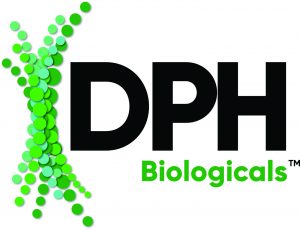 DPH Biologicals, a leading biological company formed in 2018, has announced a management-led buyout with a private investment group, while the company will continue to market under the DPH Biologicals brand and continue to provide the same high-quality products and service.
DPH Biologicals, a leading biological company formed in 2018, has announced a management-led buyout with a private investment group, while the company will continue to market under the DPH Biologicals brand and continue to provide the same high-quality products and service.
“With proven science, robust field data, strong industry relationships and a focus on biologicals, we are proud of DPH Bio’s robust and profitable growth the past several years. As the biologicals market grows, we believe farmers and producers around the world will increasingly demand biological products that work within existing management practices and offer multiple bottom-line benefits, beyond yield,” said Mick Messman, DPH Bio president and CEO.
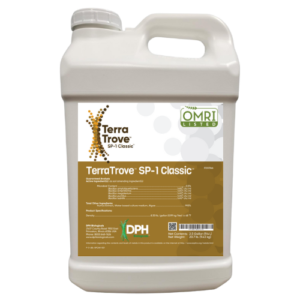 The full management team brings decades of experience in agricultural sales, marketing, research, product development, supply chain management and business strategy, both domestically and internationally, and led the company’s rapid scale up and product portfolio expansion, building upon its flagship product – TerraTrove® SP-1®. The DPH Bio management team includes Mick Messman, Alex Cochran, Chris Feiden, Trey Soud, Brad Holzworth, Roberto Werneck and Cliff Watrin, and Mario Tenerelli as Latin America advisor.
The full management team brings decades of experience in agricultural sales, marketing, research, product development, supply chain management and business strategy, both domestically and internationally, and led the company’s rapid scale up and product portfolio expansion, building upon its flagship product – TerraTrove® SP-1®. The DPH Bio management team includes Mick Messman, Alex Cochran, Chris Feiden, Trey Soud, Brad Holzworth, Roberto Werneck and Cliff Watrin, and Mario Tenerelli as Latin America advisor.
“Our team has demonstrated business success in the ag industry and a commitment to deliver value to farmers. We saw the need for a company focused on developing and scaling biological technologies and began the transformation of DPH Bio in mid-2021. When ownership discussions started last year, the existing management team decided the time was right and we were ready and willing to fully invest in the company ourselves,” Messman said.
With teams based in Indianapolis, Ind. and Princeton, Ill., and territory managers located in key markets, Messman adds that DPH Bio will continue bringing its diverse and growing product line to customers around the world, including planned expansion into Brazil.
Visit www.dphbio.com for more information.
Truterra Announces 2024 Programs and Expanded Eligibility
 Truterra is announcing programs for farmers to enroll in for 2024, with several new developments.
Truterra is announcing programs for farmers to enroll in for 2024, with several new developments.
Among the program options for enrollment is Truterra’s leading carbon program, which in just two years paid farmers more than $9 million for more than 462,000 metric tons of carbon benefits created through farming practices such as planting cover crops or reducing how often fields are tilled. For the first time in 2024, Truterra is expanding eligibility of its carbon program to include qualified long-term adopters of conservation practices, specifically for qualified farmers who have adopted conservation practices like cover crops or reduced tillage before crop year 2021.
Bringing long-term adopters into the fold is a strategic step toward meeting the needs of companies seeking to reduce scope 3 emissions from within the food and ag value chain. According to McKinsey1 and Company, sales of consumer goods products made with sustainability goals are growing 36% faster than those made without them, which is why Truterra is sharpening its focus on how it can help play a role in the solution for companies to help decarbonize their supply chains and meet their emissions-based goals. These long-term adopters potentially have favorable greenhouse gas emissions and storage profiles which may benefit companies in the food and ag value chain – and the program this year will help to establish a baseline and understand the opportunity.
“The expansion of eligibility for qualified farmers is something we’re proud to offer and is another step forward in our mission to meet farmers wherever they are in their sustainability journey,” said Truterra President Jamie Leifker. “Truterra is committed to working with ag retailers to maximize their relationships with farmers, as they are often the most trusted advisor. We will continue to expand our ag retail network and together lead the way with innovative solutions to position farmers to increase their productivity and profitability while working to improve the long-term environmental sustainability of their operations.”
Enrollment for Truterra’s 2024 sustainability programs is open now. Interested farmers can visit truterraag.com/enroll to learn more and explore eligibility.
Beltwide Cotton Awards
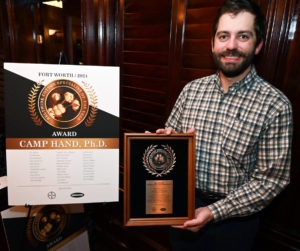 Several awards were presented at the Beltwide Cotton Conferences last week. Here are two of them.
Several awards were presented at the Beltwide Cotton Conferences last week. Here are two of them.
Each year the University Extension Cotton Specialists select a colleague to recognize as the Beltwide Extension Cotton Specialist of the Year. Camp Hand, University of Georgia assistant professor in Crop & Soil Sciences, received this annual award for his leadership, dedication and exceptional service in developing and conducting educational programs to meet the needs of cotton producers and the U.S. cotton industry.
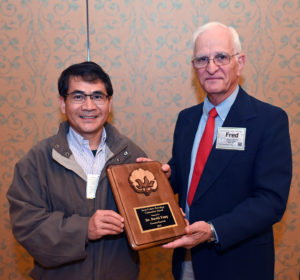 Dr. David Fang, geneticist for USDA-ARS at the Cotton Fiber Bioscience Research Unit in New Orleans, is the 2023 Cotton Genetics Research Award recipient.
Dr. David Fang, geneticist for USDA-ARS at the Cotton Fiber Bioscience Research Unit in New Orleans, is the 2023 Cotton Genetics Research Award recipient.
Dr. Fang has made tremendous contributions to the development of molecular markers which have been made publicly available and are utilized in practical cotton breeding and realized potential in a population derived from crosses made by USDA-ARS colleagues. Dr. Fang also has constructed numerous genomic maps of cotton and identified numerous markers for various agronomic traits.
Animal Ag News 1/8
2024 Cotton Economic Outlook
One of the drawbacks of having a conference right after the holidays is that you may have some presenters end up sick. But not usually four in the same session.
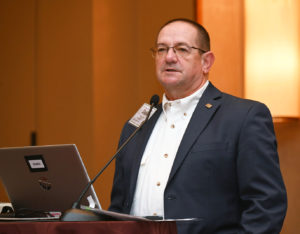 That’s what happened at the Economics and Marketing part of the National Cotton Conferences last week in Fort Worth, but Dale Cougot of Olam Agri, who serves as the National Cotton Council Southwest Region Merchant Delegate, bravely stepped forward to fill all four roles and provide the cotton market outlook, world cotton outlook, and cotton policy update.
That’s what happened at the Economics and Marketing part of the National Cotton Conferences last week in Fort Worth, but Dale Cougot of Olam Agri, who serves as the National Cotton Council Southwest Region Merchant Delegate, bravely stepped forward to fill all four roles and provide the cotton market outlook, world cotton outlook, and cotton policy update.
Cougot stressed that consistent supply is crucial for the industry to maintain its market share. “The last three years when the U.S. had a fairly low crop, from a global cotton perspective, thank God Australia had a crop,” he said. “In the retail world, if you lose a product line, you never get it back. So you’ve got to have that consistent supply to our retailers.”
Listen to Cougot’s outlook presentation.
BWCC Economic Outlook - Dale Cougot, Olam Agri 40:02
broadhead Acquires Filament
 broadhead has acquired Filament which makes it one of the nation’s largest agencies serving industry-leading food and agriculture clients.
broadhead has acquired Filament which makes it one of the nation’s largest agencies serving industry-leading food and agriculture clients.
broadhead, an employee-owned, data-driven, creative agency powering brands that transform how we eat, move and live, has acquired Filament, a Madison, Wisconsin-based agency specializing in production and recreational agriculture.
With a segment-leading client portfolio, Filament has a strong history in helping client brands resonate with the end-user and influencer audiences they know well. The agency was founded in 2004 and currently employs 50 people.
“At broadhead, we’ve long respected Filament’s work, their people and its role as a thought leader in the agricultural marketing space,” said Dean Broadhead, founder and CEO of broadhead. “Together, we’ll have added depth across teams that will help us build opportunities for our clients and for our people.”
Read More
Industry Ag News 1/5
U.S. Cotton Trust Protocol Update
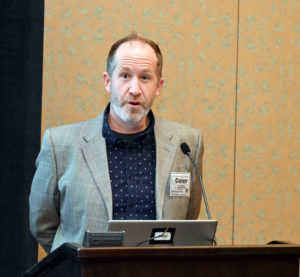 The Beltwide Cotton Conferences Sustainability Conference included an update on the U.S. Cotton Trust Protocol by new executive director Daren Abney who assumed that position in July 2023.
The Beltwide Cotton Conferences Sustainability Conference included an update on the U.S. Cotton Trust Protocol by new executive director Daren Abney who assumed that position in July 2023.
Abney says membership in the program continues to increase. “We work with the entire cotton supply chain so we take memberships from growers all the way up to retailers and brands,” said Abney. “The first year of the protocol had just over 300 or so growers but as of this season we are now over 970 growers participating.”
The protocol saw an increase of 25% compared to 2022 in the total area of planted cotton acres enrolled in the program, reaching 1.6 million acres in 2023.
Interview with Daren Abney, US Cotton Trust Protocol Executive Director 4:37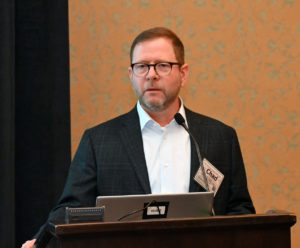 Chad Brewer, who worked on the protocol since December 2022, says growers were able to sign up this year for the Climate Smart Cotton Program. “April 25 we began the program and we began staffing up and building out our enrollment interface,” said Brewer. “Of the 978 farmers that enrolled in the U.S. Cotton Trust Protocol, 778 of them submitted applications for the Climate Smart Cotton Program, which far exceeded our milestone for year one.”
Chad Brewer, who worked on the protocol since December 2022, says growers were able to sign up this year for the Climate Smart Cotton Program. “April 25 we began the program and we began staffing up and building out our enrollment interface,” said Brewer. “Of the 978 farmers that enrolled in the U.S. Cotton Trust Protocol, 778 of them submitted applications for the Climate Smart Cotton Program, which far exceeded our milestone for year one.”
The Trust Protocol’s vision is to set a new standard in sustainable cotton production where full transparency is a reality and continuous improvement is the central goal. The program’s core values include a commitment to U.S. cotton’s legacy of authenticity, innovation and excellence, environmental stewardship, caring of people, and personal and corporate integrity. The program currently has more than 1,800 supplier members over 40 companies and brands including global brands and retailers such as Ralph Lauren, Gap, Levi Strauss & Co. and J.Crew.
Interview with Chad Brewer, US Cotton Trust Protocol/NCC 4:26Cotton Consultants Kick Off Beltwide
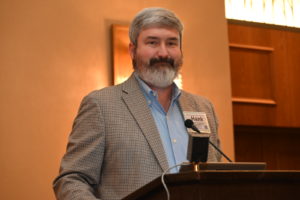 The Consultants Conference kicked off three days of Beltwide Cotton Conferences Wednesday in Fort Worth, Texas.
The Consultants Conference kicked off three days of Beltwide Cotton Conferences Wednesday in Fort Worth, Texas.
Louisiana consultant Hank Jones says the committee works to include lots of topics of interest to cotton consultants. “We try to cover a wide range of topics and certainly we want to stay current, and want to address topics that are going to provide value for us and our customers,” said Jones. Some of those topics this year included new cottonseed varieties and how to best manage them, new technology and products, and a regulatory update on the Endangered Species Act.
Interview with Hank Jones, cotton consultant 6:31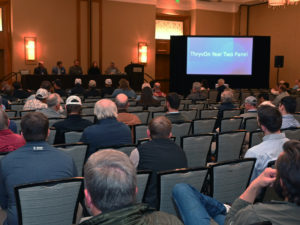 The conference also included a panel discussion about Bayer’s ThryvOn Technology, the first biotech trait for tarnished plant bug and thrips species, which was fully approved for commercial use in 2023.
The conference also included a panel discussion about Bayer’s ThryvOn Technology, the first biotech trait for tarnished plant bug and thrips species, which was fully approved for commercial use in 2023.
Arkansas cotton consultant Tyler Hydrik says it has been very successful. “It has completely eliminated the need to spray for thrips and I think we can cut back on plant bug applications as well,” said Hydrik. “Overall, I think everybody’s really happy with it and the percent of acres that it’s going to take up in ’24 is definitely going to increase.”
Listen to the interview with Hydrik and panel discussion to learn more.
Interview with Tyler Hydrik, cotton consultant 4:49Consultants Conference Thryvon panel
2024 BWCC Thryvon panel 47:42




